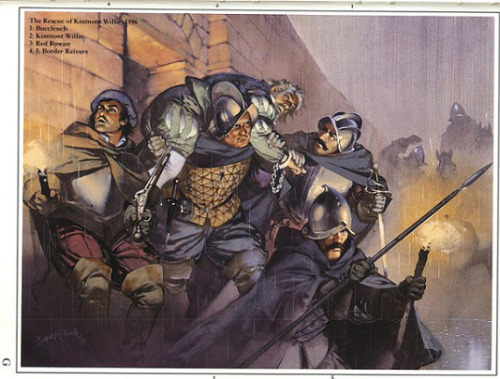#border reivers
On April 13th 1596 Walter Scott of Buccleuch freed notorious reiver William Armstrong of Kinmont in a daring raid on Carlisle Castle.
Perhaps the best known of the Border reivers (outlaw raiders or rustlers), William Armstrong of Kinmont’s first recorded raid was against the Milburns of Tyndale, in August 1583, when Armstrong was probably in his forties. In 1585 he accompanied the Earl of Angus`s campaign against the Earl of Arran and pillaged Stirling. Eight years later he was in Tynedale again with 1,000 men, carrying off over 2,000 beasts and £300 in spoils.
The events of 1596 and the rescue of ‘Kinmont’ Willie Armstrong represent a daring swashbuckling adventure. The fact that Kinmont led one of the most notorious bands of cut-throats ever to roam the Debatable Land seems to be irrelevant and in the tradition of the Border ballads we are to view him as a hero. His notoriety and activities were such that the Warden of the West Marsh’s deputy, Salkeld, captured Kinmont as he returned from a Truce Day at the Dayholm of Kershope. Kinmont was taken to Carlisle.
According to Border Law it should not have happened on a Truce Day and Walter Scott of Buccleuch who became known as The Bold Buccleuch, and was keeper of Liddesdale on whose land the arrest had been made, protested to the Warden, Lord Scrope. When Scrope refused to return Kinmont, Buccleuch became concerned that Scrope was anxious to hang Kinmont on the gallows at Harraby and so assembled a motley bunch of Elliots, Scotts, Armstrongs and Grahams to effect a rescue. Oral tradition has meant that the numbers vary from 40 to 200. The weather was atrocious which made crossing the River Eden very dangerous, but it did mean that the castle watch had taken shelter. Buccleuch left a group to cover the retreat and led the raiding party himself. Popular opinion has it that they must have had support from the inside because they entered the castle quickly. Thus with the aid of a sturdy Reiver, Red Rowan, Kinmont made his escape.
In 1600, Armstrong attacked the village of Scotby with 140 riders, burning and taking prisoners and cattle. In 1602 he rode his last foray, south of Carlisle. He was still alive two years later, and his four sons who had helped to get him out of Carlisle Castle are frequently named in the later Border raids. Legend supposes he died in his bed of old age, sometime between 1608 and 1611.
As is usual with these Border legends we look to the old sources of the story tellers before reading and writing was the norm, the old songs. Francis James Child was an American scholar and collector of Ballads, if you follow my posts you will no doubt have seen me posting “Child Ballads” at times, this story comes from Child Ballad 186. This ballad is more unusual than most of the songs I know from the Child Ballads as it is longer than most at 20 verse so I wont post it, you can look it up on YouTube as Child Ballad 168, but it’s over 9 minutes wrong in full!
Post link


